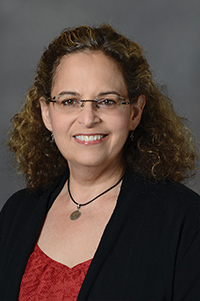 The Future Isn’t What It Used to Be
The Future Isn’t What It Used to Be
This year’s gathering for engineering technology leaders offered visions for education on the other side of the pandemic.
By Patricia Fox
For 46 years, ASEE’s Engineering Technology Council (ETC) has hosted the Engineering Technology Leaders Institute for educators, industry representatives, and government officials. This year’s event, focused on topics of relevance to ET graduates, took place virtually on October 1. The theme: Back to the Future. Faculty hope to implement lessons from the past two years of the pandemic into ET education moving forward.
ASEE President Adrienne Minerick opened the day by emphasizing the need for a cultural shift within the whole engineering education community: from a focus on case studies and silos to context and cooperation. “ET students are [already] trained to see a bigger picture and context,” she said, praising their cross-boundary thinking. “Our engineering culture defaults to skepticism, scrutiny, and placing obstacles in front of ideas, instead of approaching … with flexibility, opportunities, and cooperative rigor.”
Further sessions continued the ET cultural conversation. Here are a few highlights:
Impediments to engineering technology graduates’ pursuit of professional engineering licensure and careers have long been important discussion topics. Shawn E. Thompson, vice president of engineering for PCB Piezotronics, spoke on the many barriers to licensure at the state and federal levels that block professional pathways for four-year ET graduates. “The needs for mathematics and theory are the lowest in history,” Thompson said, but they are seen as the most essential pieces for engineering licensure. “The need for technical aptitude and understanding is at its greatest; however, these are marginalized as not part of ‘real’ engineering. This contradiction has already passed a critical point for industry.”
Another session examined the need for new programs for engineering technology students. It included discussions on increasing diversity, equity, and inclusion in community colleges and expanding online learning opportunities. Athula Kulatunga, the engineering technology department chair at Purdue University Northwest, introduced a rapid skill development program for first-year engineering technology students called Discipline Specific Skill Acquisition (DSSA). It was developed to attract new students and create an environment that will set them up for success. Kulatunga noted the gap between incoming students’ expectations of what they need to know as they begin higher education and those of professors—and, relatedly, the fact that students often enter colleges without the entry-level skills faculty look for, such as measurements, algebra, drawing, and basic computer-aided design. The DSSA program will help bridge that gap and create a better higher education experience for all students.
ETLI’s third session examined the knowledge and skills gaps between engineering and engineering technology graduates as seen by educators and industry. Shannon O’Donnell, Siemens’ digital industries software strategy lead for global academic programs, presented on the transition from theory to application and the capabilities employers seek in graduates. The greatest professional skills deficits, she notes, are in the areas of project management, critical thinking, and ethics. To combat this, schools must focus on real-world case studies and project-based learning.
A fourth session offered attendees a look at the evolving federal landscape and what it means specifically for engineering technology education. Miriam Quintal and Amanda Bruno, both with government relations firm Lewis-Burke Associates, provided tips on advocating for ET at the federal level virtually and in communities. Advocacy, they say, is all about building relationships with local policy makers and representatives. “Persistent, concerted, and disciplined efforts are key.”
During the lunch break, Joe Sussman, ABET’s chief accreditation and information officer, provided an update on remote accreditation operations during the pandemic. Using virtual facility tours, interviews, exit meetings, and review alerts, the Engineering Technology Accreditation Commission was able to review 153 ET programs at 57 institutions in 2020–21 and 128 programs at 54 institutions (so far) in 2021–22 despite setbacks from COVID-19 variants. The organization expects to continue using virtual accreditation processes at least through the remainder of the 2021–2022 cycle.
Those who were not able to attend the ETLI can view all of the sessions at https://etli.org. Next year’s meeting will be held in person in or near Washington, D.C., in September; exact dates to be announced. For more information on ETLI 2022, contact Hugh Jack at hughjack@email.wcu.edu. If you would like to get involved in ETC, contact Marty Gordon, ETC chair, at megite@rit.edu.
Patricia Fox is the immediate past chair of ASEE’s Engineering Technology Council and clinical assistant professor of organizational leadership in the School of Engineering and Technology at Indiana University-Purdue University Indianapolis (IUPUI).